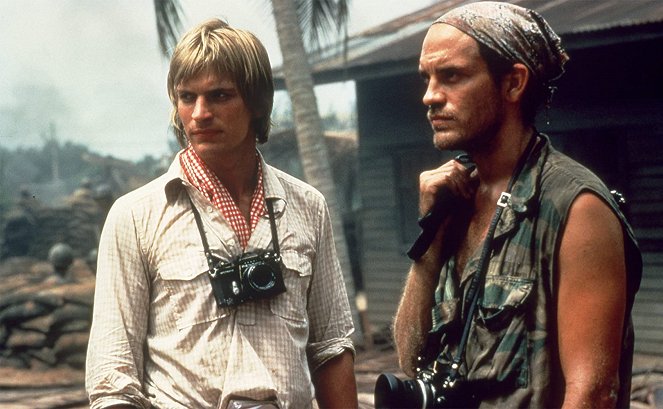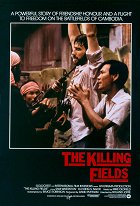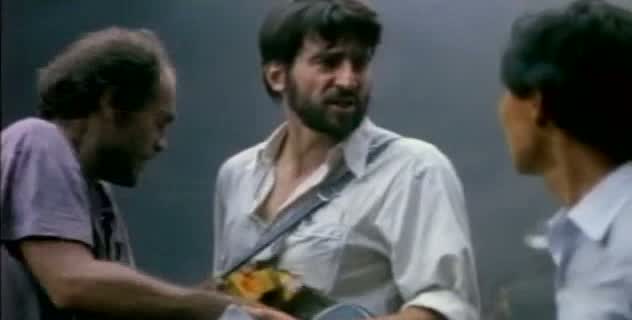Rendező:
Roland JofféForgatókönyvíró:
Bruce RobinsonOperatőr:
Chris MengesZeneszerző:
Mike OldfieldSzereplők:
Sam Waterston, Haing S. Ngor, John Malkovich, Julian Sands, Craig T. Nelson, Spalding Gray, Bill Paterson, Athol Fugard, Mark Long, Patrick Malahide (több)Tartalmak(1)
Sydney Schanberg újságíró a New York Times délkelet-ázsiai tudósítója. A polgárháború sújtotta Kambodzsából küldözgeti tudósításait. Munkája során a legfőbb segítője egy helybéli tolmács. Miután a vörös khmerek átveszik a hatalmat, minden megváltozik. Rémuralmuk alatt valóságos népirtás veszi kezdetét, minden ellenzékivel, értelmiségivel leszámolnak. Dith Pran élete is veszélybe kerül. A férfi megszökik a koncentrációs táborból, miközben Sydney mindent megtesz annak érdekében, hogy megpróbálja őt kimenekíteni az országból. A film megtörtént esetet dolgoz fel. (Cinemax)
(több)Videók (1)
Recenziók (9)
The Killing Fields is a movie where ambition simply oozes out of every frame. I’m not saying it’s bad. Especially when it’s in the hands of a director who knows how to avoid cheap sucking up to the Academy (although Lennon at the end was a step way over the mark). In the first half I couldn’t help asking myself why the story revolves round such an uninteresting, self-centered journalist when his gofer who he treats like shit is a hundred times more interesting. And luckily the filmmakers thought this too and in the second half they put him to the fore. And did well to do it in my eyes. Otherwise the scenes like developing photos in Spartan conditions, the video with Nixon’s speech and shots of the atrocities of the Khmer Rouge cut with Vincerò or lost in the killing fields are such powerful scenes that Roland Joffé has earned my greatest admiration. On the other hand, it doesn’t change the fact that I can see mistakes here. Which I can’t say about his next movie, however much I might want to.
()
Roland Joffé was at the peak of his strength in the mid-1980s, and this can very much be felt in The Killing Fields. The pathos and urgency imbued double story of an American journalist and his Cambodian colleague, left to the mercy of the Khmer Rouge in the 1970s, has a very clear moral message that, surprisingly, criticizes the traditionally empathetic American foreign policy far more than the incomprehensible Khmer Rouge fanaticism. The most powerful weapon of The Killing Fields is certainly not the fairly simple and straightforward story, but rather the atmosphere and perfect evocation of the time when the West was fleeing and the Reds were approaching Phnom Penh from the rice fields. One of Joffé’s directing highlights is a multi-layered reflection on events – a documentary played from a video, Sam Waterston's desperate eyes and Puccini's bitter aria Nessun Dorma. Powerful. So powerful that even Lennon's final "Imagine" cannot compete with the moment of awareness of absurdity, injustice, and hopelessness. From my perspective, the film could have been a few dozen minutes longer, because the passages from the Ankha camp are absorbing and extremely interesting. Unfortunately, it is also incomplete, too curt and sometimes unnecessarily tendentious (the truly "flash" episode with the baby boy). Although, similarly to Stone's Platoon, this is a literal and manipulative film, the theme and performance represent a delicacy that I had experienced in a spectator trance. The style in which Joffé involuntarily incorporates suffering and brutality into the story reflects some of the coldness and disinterest of the mass media... and that's why it sounds like a desperate cry. Certainly not a flawless film, but undoubtedly a powerful viewing experience for anyone interested in red totalitarianism.
()
I would make all voters of the Communist Party watch this film, because this is what it looks like when communism is put into practice. Joffé perfectly portrayed the dark atmosphere of genocidal Cambodia under the Khmer Rouge, the communist uniformity and brainwashing makes you sick, many scenes will give you the chills. In Pol Pot’s Cambodia, almost anything was possible in terms of evil and trampling on human dignity, so it is not surprising that even a "little girl with a blue plastic bag" can easily become synonymous with death. The performance of Cambodian non-actor Haing S. Ngor as Dith Pran, an interpreter who experiences the Pol Pot regime first-hand, is riveting and rightfully Oscar-winning. Interesting fact, Haing himself went through the hell of the Pol Pot regime, which makes his performance all the more believable.
()
How is it possible that such powerful content can be expressed through masterful form? With this film, a picture often says more than a few thousand words. Rather than an uncompromising anti-communist agitprop, The Killing Fields is a gripping story about the distressing reunion of two lifelong friends. With great distinctiveness and candor, the first half skillfully captures the disarray of a state affected by the clenched fist of the communist revolution. The second half then shows with what coldness the social stratum of intelligence can be liquidated. The relentlessness of the labor camp, from which there is essentially no escape, then escalates into horrifying images dominated by a little girl with a blue plastic bag, and the subsequent transition to the "killing field." The ending becomes even more powerful and emotional, causing even the toughest person to momentarily forget their toughness and be deeply moved.
()
There is nothing difficult to understand about the premise of this film. The main motive is the friendship of a professional journalist who tries to map the events in Cambodia and a local who takes him around this mysterious and beautiful country. Unfortunately, at a time when the Khmer Rouge are trying to seize the government. A story that only real life could have written. When we add in the precise camera and the fact that the Khmers carried out purges that would make even Hitler green with envy, trust me it’s not a pleasant viewing experience. The first half lets you navigate yourself in the events, but the second shows true evil. It baffled me that anyone would participate in such atrocities. It was horrifying, not only visually in some scenes but also in terms of the psychology of certain characters. It’s been a long time since I spent two hours just gaping at some film in total stupor.
()
Galéria (73)
Photo © Warner Bros. Pictures




Hirdetés